|
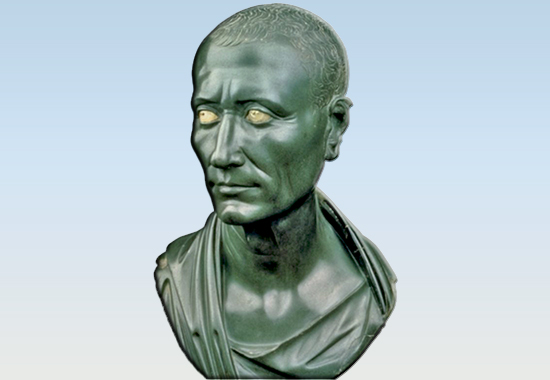
Gaius Julius Caesar 100 - 44 BC
Roman general and
statesman Gaius Julius Caesar was energetic, intelligent, and generous.
|
|
Image Above
Green basanite [quartz] bust of
Julius Caesar. And the British Museum comments:
This portrait is most likely
an image of Caesar made fifty years or more after his murder
in 44 BC. The stone is from Wadi Hamamat in Upper Egypt, and
the facial structure, with high cheekbones and prominent
chin, is reminiscent of many Egyptian portraits.
British Museum London
|
The Russian word czar and
the German word kaiser derive from Julius Caesar's name.
Although he was
imperator, he never ruled an empire.
See more under
 Forms of Governments -
Empire.
Forms of Governments -
Empire.
As it was
common and accepted in his culture, Caesar was a lover of both
genders.
Julius Caesar's
Life: 100-75 B.C.
Julius was born into a misgoverned and chaotic Rome, its streets
filled with revolutions and massacres. Julius's father, Gaius Caesar, died when Julius was 16 years old.
His mother's name was Aurelia. Julius decided upon a political
career. In the year 84 B.C. Julius married Cornelia. Because Cornelia's
folks were known as political radicals, Julius was pressured to
divorce her. He refused and thought it would be a good idea to leave
Italy for a while. In the year 78 Julius came back to Rome and
resumed his political career as a lawyer. He also studied oratory
and became an excellent public speaker.
Julius Caesar
and the Pirates
Julius was a man of enormous pride and courage. One day, while on his way to
Rhodes to study oratory, Julius was captured by pirates. Julius was
outraged by the low ransom the pirates demanded for his life. So, he
made them raise the amount of the ransom and told them that he, once
set free, would return to kill them all. And so he did.

Gaius Julius Caesar
Julius Caesar's
Life: 74-59 B.C.
Rome was at odds with
 Mithradates, king of Portus. Both factions desired domination
over Asia Minor. When Rome was going to annex Mithradates, king of Portus. Both factions desired domination
over Asia Minor. When Rome was going to annex
 Bythantia,
Mithradates started the Bythantia,
Mithradates started the
 Third Mithradatic War in 74 B.C. Julius drummed up a private
army and joined the fight. The war lasted until the year
63 B.C. Third Mithradatic War in 74 B.C. Julius drummed up a private
army and joined the fight. The war lasted until the year
63 B.C.
Cornelia died in the year 69 B.C.
(or in the year 68 B.C., thanks CP for
pointing this out!) and
Julius moved on and married Pompeia.
In the year 68 B.C., Julius was
elected
 Quaestor of
Farther Spain. His career took off and in 65 B.C. he was elected as
one of the Quaestor of
Farther Spain. His career took off and in 65 B.C. he was elected as
one of the
 Curule
Aediles, and in 63 B.C. he was elected Curule
Aediles, and in 63 B.C. he was elected
 Pontifex
Maximus. Pontifex
Maximus.
Julius was on the roll and in 62
B.C. he was elected
 Praetor. In the same year he divorced Pompeia. Good things kept
coming Julius's way and in the year 61 B.C. he was made Governor of
Farther Spain and formed with Praetor. In the same year he divorced Pompeia. Good things kept
coming Julius's way and in the year 61 B.C. he was made Governor of
Farther Spain and formed with
 Pompey and Pompey and
 Crassus
the Crassus
the
 First Triumvirate. First Triumvirate.
Up the career ladder, Julius was
made consul in the year 59 B.C. Also in the year 59 B.C. he
married Calpurnia.
CONQUEST OF GAUL 58 - 50 B.C.
- THE GALLIC WARS
In
58 BC Julius Caesar begun his conquest of Gaul.
In 58 BC, he
defeated the Helvetii in the
 Battle of Bibracte.
Battle of Bibracte.
In 57 BC, the Nervii were
defeated at the Battle of
the Sambre. Here you can read
 Caesar's own account of the year 57 BC. Caesar's own account of the year 57 BC.
In 56 BC,
Julius Caesar destroyed the huge fleet of the Veneti in
 Quiberon Bay. Quiberon Bay.
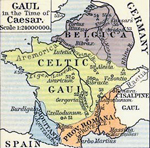
1st Century
BC Gaul
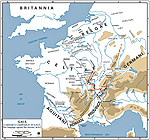
Map of Caesar's Campaign Against the Helvetii 58 BC
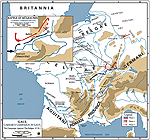
September 58 BC - Battle at Mulhouse
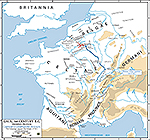
57 BC Caesar's Campaign Against the
Belgae
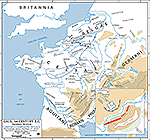
57 BC / 56 BC Caesar's Campaign
Against the Belgae
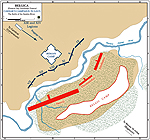
Map of the Battle of the Sambre 57 BC
RAIDS ON BRITAIN
...
and the Gallic Wars continue
In 55 B.C. Julius Caesar
led raids on Germany and Britain. In 54 B.C. followed his second
raid on Britain on which occasion the
Catuvellauni were
defeated.
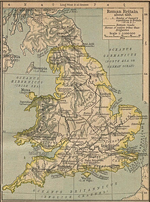
CAESAR'S ROUTES IN BRITAIN
Click map to enlarge
Here is more on
 Roman Britain
Roman Britain
In 52 B.C. Rome encountered the
Gallic crisis, a Gallic revolt led by
 Vercingetorix. The
Romans lost the Vercingetorix. The
Romans lost the
 Battle of
Gergovia, but Julius Caesar had again everything under control later that year after
the Siege of Alesia.
Battle of
Gergovia, but Julius Caesar had again everything under control later that year after
the Siege of Alesia.
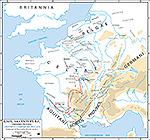
54 BC Outbreak of the
Gallic Revolt
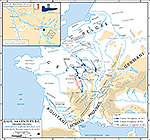
53-52 BC Gallic Revolt
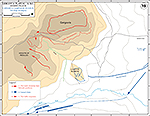
52 BC Siege of Gergovia - Part One
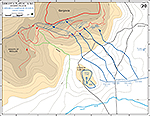
52 BC Siege of Gergovia - Part Two
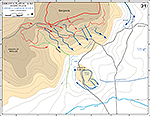
52 BC Siege of Gergovia - Part Three
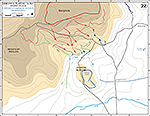
52 BC Siege of Gergovia - Part Four
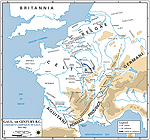
52 BC Gaul: From Gergovia to Alesia

52 BC Siege of Alesia
ROMAN CIVIL WAR 49 - 45 B.C
The civil war between Caesar and the Pompeian party.

Map of the Roman Civil War 49-45 BC
Julius Caesar was a member of the
 First Triumvirate. However, this political agreement
failed him and so did his net of supporters in Rome. In
December 50 BC, Senate demanded that Caesar should lay down
his command. First Triumvirate. However, this political agreement
failed him and so did his net of supporters in Rome. In
December 50 BC, Senate demanded that Caesar should lay down
his command.
Caesar had other plans.
By Roman law a general and his
army was not allowed to cross the borders out of
his assigned province into the Roman Republic. Julius
Caesar was ready to revise this custom, and on January 10,
49 BC, he crossed the tiny river Rubicon with his troops,
heading for Rome.
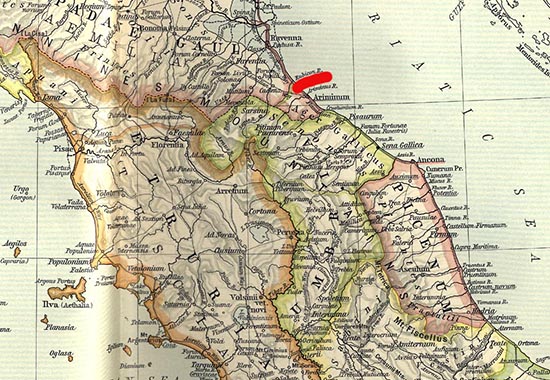
Map Location of the Rubicon River
Click map to enlarge
As expected, Rome saw this as an act of aggression
and the Roman Civil War begun.
Caesar drove
 Pompeius (Pompey) out of
Italy, conquered his enemy's forces in Spain by means of his
Campaign of Ilerda, and then passed
into Greece, where Pompeius and the other aristocratic
chiefs had assembled a large army.
Pompeius (Pompey) out of
Italy, conquered his enemy's forces in Spain by means of his
Campaign of Ilerda, and then passed
into Greece, where Pompeius and the other aristocratic
chiefs had assembled a large army.
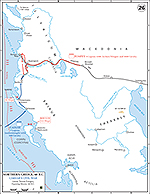
Roman Civil War: Opening Moves 48 BC
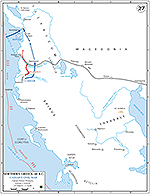
48 BC - March 27- April 3 - Roman
Civil War: Antony's Arrival
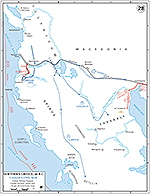
Roman Civil War: Scipio's Arrival 48
BC
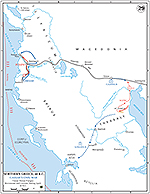
Roman Civil War: Movements During
April 48 BC
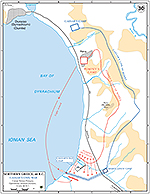
Roman Civil War: Operations Around
Durazzo - July 6, 48 BC
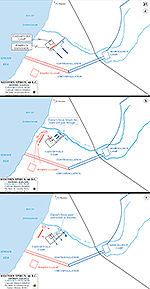
Roman Civil War: Battle of Dyrrachium
- July 9, 48 BC
On August 9, 48 BC, Caesar gave them a decisive
defeat at the great Battle of Pharsalia, also called
Battle of Pharsalus.
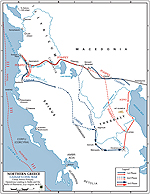
48 BC Roman Civil War: Moves to
Pharsalus

48 BC Battle of Pharsalus
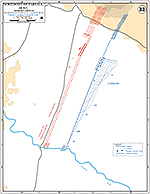
Roman Civil War: Battle of Pharsalus
August 9, 48 BC - Caesar Creates a Fourth Line
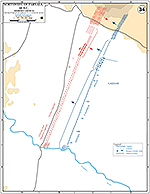
Roman Civil War: Battle of Pharsalus
August 9, 48 BC - Initial Advances
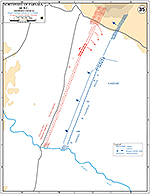
Roman Civil War: Battle of Pharsalus
August 9, 48 BC - Pompey's Cavalry Breaks Through
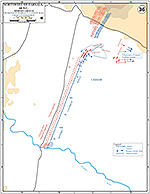
Roman Civil War: Battle of Pharsalus
August 9, 48 BC - Caesar's Counter-Attack
Pompeius fled for refuge to Alexandria, where he was assassinated. Caesar, who had followed him,
got involved in a war with the Egyptians, in which he was finally
victorious.
The celebrated
 Cleopatra was made Queen of Egypt
and in the year 48 B.C. while in Alexandria, Egypt, Julius Caesar
and Cleopatra became real good friends. Cleopatra was made Queen of Egypt
and in the year 48 B.C. while in Alexandria, Egypt, Julius Caesar
and Cleopatra became real good friends.
In 47 BC, Caesar marched into Pontus,
and defeated the son of
 Mithridates,
Pharnaces II, who had taken part in the war against him
at the Battle of Zela. Mithridates,
Pharnaces II, who had taken part in the war against him
at the Battle of Zela.
He then went back to Rome and
afterwards proceeded to the Roman
province of Africa, where some of the Pompeian chiefs had
established themselves, aided by Juba, a native
prince.
In 46 BC, Caesar overthrew them at the
 Battle of Thapsus
and went back home to Rome. He was again obliged to lead an army into Spain, where the
sons of Pompeius had collected the wrecks of their father's
party. Battle of Thapsus
and went back home to Rome. He was again obliged to lead an army into Spain, where the
sons of Pompeius had collected the wrecks of their father's
party.
On March 17, 45 BC, Caesar crushed the last of his
enemies at the
Battle of Munda, which ended the Civil War.
Julius won the Roman Civil War and
became ruler of the Roman Republic in the fashion of dictator.
Julius Caesar's
Assassination, Death & Legacy
A conspiracy among several aristocrats
resulted in the assassination of Gaius Julius Caesar. He was stabbed
to death on the Ides of
March (March 15) 44 B.C. in the Senate House.
 What in the world are
the ides? What in the world are
the ides?
Some of the conspirators were his closest friends,
for instance Brutus.
 Check out
Assassinations in History. Check out
Assassinations in History.
After Julius's assassination, his nephew
and adopted son
 Augustus Caesar (Gaius Octavius) became the first Roman Emperor. Not
until after Augustus's death succeeding Roman rulers named themselves
Caesar and used it as a title. Augustus Caesar (Gaius Octavius) became the first Roman Emperor. Not
until after Augustus's death succeeding Roman rulers named themselves
Caesar and used it as a title.
Cæsar was used as a title of emperors
down to Hadrian, who died in 138 A.D.
After Julius' death, the Civil wars are soon renewed, Brutus
and Cassius being at the head of the aristocratic party, and
the party of Caesar being led by
 Mark Antony and Octavianus
Caesar, afterwards Augustus. Mark Antony and Octavianus
Caesar, afterwards Augustus.
Then in 42 BC - the defeat and
death of Brutus and Cassius at Philippi. Dissensions soon
break out between Octavianus Caesar and Antony.
Julius Caesar's
Children
Julius had a daughter named Julia
by Cornelia. He also had a son named Caesarion (the later
Ptolemy XV) by
 Cleopatra VII. Cleopatra VII.
Rome's
Expansion
Here is the map:
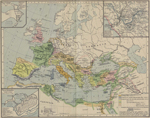
MAP BEFORE AND AFTER GAIUS JULIUS CAESAR
Click to enlarge
Julius Caesar
and the Calendar
In Julius's honor, the Roman calendar month Quintilis was renamed
July, as it was the month of his birth. Was this done during
his lifetime or after his death? Historians can't agree.
Julius also made calendar reforms.
We are still using the Julian calendar today but
 Pope
Gregory XIII made some amendments in the year 1582 A.D. Thus, we are
calling it the Pope
Gregory XIII made some amendments in the year 1582 A.D. Thus, we are
calling it the
 Gregorian calendar. Gregorian calendar.
|
Caesar Salad
|
|
 |
Julius was not responsible for our Caesar Salad.
Allegedly, the salad was invented by a Mexican Restaurant owner.
Here is a
 good looking Caesar salad recipe. good looking Caesar salad recipe. |
Julius Caesar's Writings
 You can read Julius's writings online for free in Latin
and English (De bello Gallico also in French) You can read Julius's writings online for free in Latin
and English (De bello Gallico also in French)
Caesar wrote De bello Gallico and
De bello civili.
The Bellum Alexandrinium, on the wars of 47 BC,
De bello Africo, and De bello
Hispaniensi are all anonymous but contemporary with Caesar and
usually included with his works.
Julius Caesar Quoted
“Veni, vidi, vici” ("I came, I saw, I conquered") is Julius's
description of the short Battle of Zela, which he fought against a local king in
Anatolia in 47 B.C.
"Et tu, Brute?" ("You too, Brutus?") were Caesar's famous last words
when he realized that his close companion was involved in the plot
to assassinate him.
Please note - this is a legendary quote, which means Caesar
probably didn't actually say these exact words. But Shakespeare
decided he did. See Act 3, Scene I, of Julius Caesar. Thanks
John for your request to clarify this!
Julius Caesar and
Shakespeare
In AD 1599,
 Shakespeare wrote a tragedy in five acts, named Julius Caesar,
which you can read online for free on this site. Shakespeare wrote a tragedy in five acts, named Julius Caesar,
which you can read online for free on this site.
Julius Caesar and the
Opera
In 1724, German born composer
 Georg Friedrich
Händel presented his opera Julius Caesar in Egypt. Georg Friedrich
Händel presented his opera Julius Caesar in Egypt.
 Julius Caesar's timeline.
Julius Caesar's timeline.
More History
|